- Clone
- Tü39 (See other available formats)
- Regulatory Status
- RUO
- Other Names
- MHC class II, Major Histocompatibility complex II, human leukocyte antigen, HLA
- Isotype
- Mouse IgG2a, κ
- Ave. Rating
- Submit a Review
- Product Citations
- publications
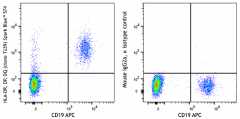
-

Human peripheral blood lymphocytes were stained with anti-human CD19 APC and anti-human HLA-DR, DP, DQ (clone Tü39) Spark Blue™ 574 (left) or mouse IgG2a, κ Spark Blue™ 574 isotype control (right).
| Cat # | Size | Price | Quantity Check Availability | Save | ||
|---|---|---|---|---|---|---|
| 361723 | 25 tests | 123€ | ||||
| 361724 | 100 tests | 292€ | ||||
HLA-DR, HLA-DP, and HLA-DQ are heterodimeric cell surface glycoproteins comprised of an α (heavy) chain and a β (light) chain. They are expressed on B cells, activated T cells, monocytes/macrophages, dendritic cells, and other non-professional APCs. In conjunction with the CD3/TCR complex and CD4 molecules, HLA-DR is critical for efficient peptide presentation to CD4+ T cells. Variations in the HLA gene expression are crucial to graft survival.
Product DetailsProduct Details
- Verified Reactivity
- Human
- Reported Reactivity
- Baboon, Cynomolgus, Cat, Dog, Cow
- Antibody Type
- Monoclonal
- Host Species
- Mouse
- Immunogen
- Human PBL
- Formulation
- Phosphate-buffered solution, pH 7.2, containing 0.09% sodium azide and BSA (origin USA)
- Preparation
- The antibody was purified by affinity chromatography and conjugated with Spark Blue™ 574 under optimal conditions.
- Concentration
- Lot-specific (to obtain lot-specific concentration and expiration, please enter the lot number in our Certificate of Analysis online tool.)
- Storage & Handling
- The antibody solution should be stored undiluted between 2°C and 8°C, and protected from prolonged exposure to light. Do not freeze.
- Application
-
FC - Quality tested
- Recommended Usage
-
Each lot of this antibody is quality control tested by immunofluorescent staining with flow cytometric analysis. For flow cytometric staining, the suggested use of this reagent is 5 µL per million cells in 100 µL staining volume or 5 µL per 100 µL of whole blood. It is recommended that the reagent be titrated for optimal performance for each application.
* Spark Blue™ 574 has a maximum excitation of 506 nm and a maximum emission of 574 nm. - Excitation Laser
-
Blue Laser (488 nm)
- Application Notes
-
Tü39 has been reported to react with a shared epitope of HLA-DR, HLA-DP, and HLA-DQ.
Additional reported applications (of relevant formats) include immunoprecipitation6, in vitro blocking of MLR5, and suppressor cell generation4. The LEAF™ purified antibody (Endotoxin <0.1 EU/µg, Azide-Free, 0.2 µm filtered) is recommended for functional assays (contact our custom solutions team). -
Application References
(PubMed link indicates BioLegend citation) -
- Pawelec G, et al. 1985. Hum. Immunol. 12:165.
- Shaw S, et al. 1985. Hum. Immunol. 12:191.
- Ziegler A, et al. 1986. Immunobiology 171:77.
- Pawelec G, et al. 1986. Hum. Immunol. 17:343. (Block)
- Dai Z, et al. 2009. J. Exp. Med. 206:793. (Block)
- Pawelec G, et al. 1988. J. Exp. Med. 167:243. (IP)
- RRID
-
AB_3068211 (BioLegend Cat. No. 361723)
AB_3068211 (BioLegend Cat. No. 361724)
Antigen Details
- Structure
- Ig superfamily, MHC class II, heterodimeric transmembrane protein
- Distribution
-
B cells, activated T cells, monocytes/macrophages, dendritic cells, other APCs
- Function
- Antigen presentation
- Ligand/Receptor
- CD3/TCR, CD4
- Cell Type
- Antigen-presenting cells, B cells, Dendritic cells, Macrophages, Monocytes, T cells
- Biology Area
- Immunology, Innate Immunity
- Molecular Family
- MHC Antigens
- Antigen References
-
1. Thorsby E. 1974. Transplant. Rev. 18:51.
2. Qvigstad E, et al. 1984. Hum. Immunol. 11:207.
3. Servenius B, et al. 1984. EMBO J. 3:3209.
4. Ottenhoff TH, et al. 1985. Hum. Immunol. 13:105.
5. Strassmann G, et al. 1985. Hum. Immunol. 13:125.
6. Trowsdale J, et al. 1985. Immunol Rev. 85:5. - Gene ID
- 3122 View all products for this Gene ID 3123 View all products for this Gene ID 3113 View all products for this Gene ID 3115 View all products for this Gene ID 3117 View all products for this Gene ID 3119 View all products for this Gene ID
- UniProt
- View information about HLA-DR DP DQ on UniProt.org
Related Pages & Pathways
Pages
Related FAQs
Other Formats
View All HLA-DR, DP, DQ Reagents Request Custom Conjugation| Description | Clone | Applications |
|---|---|---|
| Purified anti-human HLA-DR, DP, DQ | Tü39 | FC,IHC-P,IP |
| FITC anti-human HLA-DR, DP, DQ | Tü39 | FC |
| Alexa Fluor® 647 anti-human HLA-DR, DP, DQ | Tü39 | FC |
| PE/Cyanine7 anti-human HLA-DR, DP, DQ | Tü39 | FC |
| APC anti-human HLA-DR, DP, DQ | Tü39 | FC |
| PerCP/Cyanine5.5 anti-human HLA-DR, DP, DQ | Tü39 | FC |
| PE anti-human HLA-DR, DP, DQ | Tü39 | FC |
| APC/Fire™ 750 anti-human HLA-DR, DP, DQ | Tü39 | FC |
| TotalSeq™-A1018 anti-human HLA-DR, DP, DQ | Tü39 | PG |
| TotalSeq™-D1018 anti-human HLA-DR, DP, DQ | Tü39 | PG |
| TotalSeq™-B1018 anti-human HLA-DR, DP, DQ | Tü39 | PG |
| Spark Blue™ 574 anti-human HLA-DR, DP, DQ | Tü39 | FC |
| TotalSeq™-C1018 anti-human HLA-DR, DP, DQ | Tü39 | PG |
| Spark Red™ 718 anti-human HLA-DR/HLA-DP/HLA-DQ (Flexi-Fluor™) | Tü39 | FC |
| Spark Blue™ 550 anti-human HLA-DR/HLA-DP/HLA-DQ (Flexi-Fluor™) | Tü39 | FC |
Customers Also Purchased
Compare Data Across All Formats
This data display is provided for general comparisons between formats.
Your actual data may vary due to variations in samples, target cells, instruments and their settings, staining conditions, and other factors.
If you need assistance with selecting the best format contact our expert technical support team.
-
Purified anti-human HLA-DR, DP, DQ
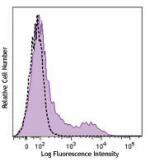
Human peripheral blood lymphocytes were stained with purifie... 
IHC staining of Purified anti-human HLA-DR, DP, DQ (clone Tü... -
FITC anti-human HLA-DR, DP, DQ
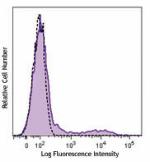
Human peripheral blood lymphocytes were stained with purifie... -
Alexa Fluor® 647 anti-human HLA-DR, DP, DQ
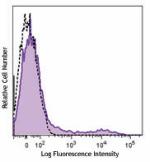
Human peripheral blood lymphocytes were stained with purifie... -
PE/Cyanine7 anti-human HLA-DR, DP, DQ
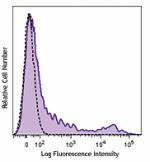
Human peripheral blood lymphocytes were stained with purifie... -
APC anti-human HLA-DR, DP, DQ

Human peripheral blood lymphocytes were stained with CD19 Al... -
PerCP/Cyanine5.5 anti-human HLA-DR, DP, DQ

Human peripheral blood lymphocytes were stained with CD19 Al... -
PE anti-human HLA-DR, DP, DQ

Human peripheral blood lymphocytes were stained with CD19 Al... -
APC/Fire™ 750 anti-human HLA-DR, DP, DQ

Human peripheral blood lymphocytes were stained with CD19 Al... -
TotalSeq™-A1018 anti-human HLA-DR, DP, DQ
-
TotalSeq™-D1018 anti-human HLA-DR, DP, DQ
-
TotalSeq™-B1018 anti-human HLA-DR, DP, DQ
-
Spark Blue™ 574 anti-human HLA-DR, DP, DQ

Human peripheral blood lymphocytes were stained with anti-hu... -
TotalSeq™-C1018 anti-human HLA-DR, DP, DQ
-
Spark Red™ 718 anti-human HLA-DR/HLA-DP/HLA-DQ (Flexi-Fluor™)
-
Spark Blue™ 550 anti-human HLA-DR/HLA-DP/HLA-DQ (Flexi-Fluor™)
 Login / Register
Login / Register 









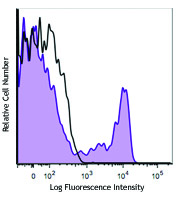

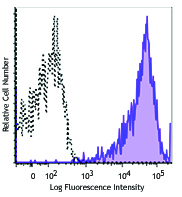
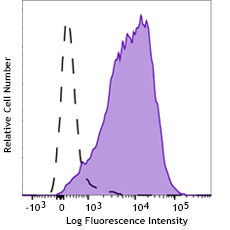



Follow Us